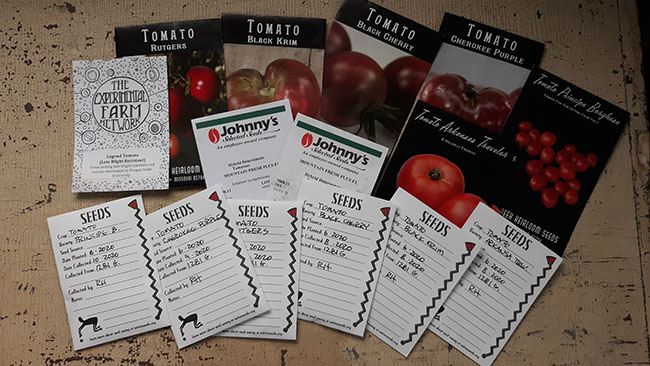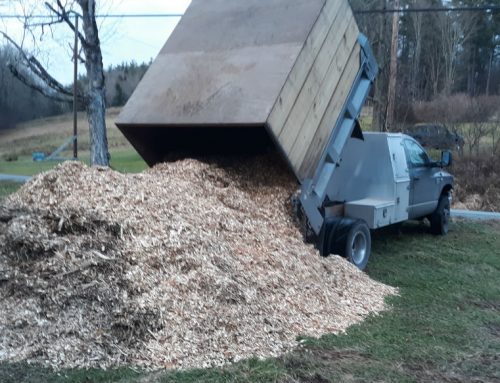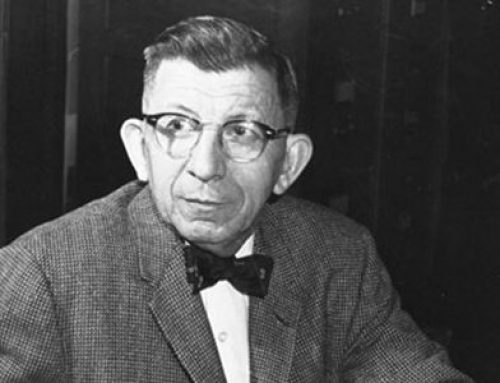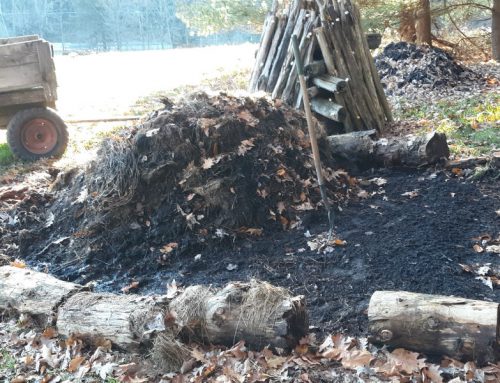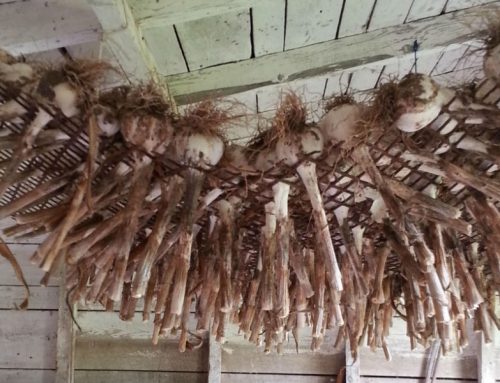We believe that a seed is more than meets the eye: it is a time capsule telling tales of the plants, crops, and people that came before us. – Hudson Valley Seed Company
From a small bucket filled with seed envelopes, my quarter-acre garden will grow. It unfolds a miracle of life, and of the seasons, repeated each year. Dormant, these seeds are waiting for the right conditions so they can germinate, thus fulfilling their cycle of life.
“Big or small, most of every seed is actually just food to sustain a waiting embryo. The embryo is a collection of only a few hundred cells, but it is a working blueprint for a real plant with root and shoot already formed.” — from Lab Girl by Hope Jahren.
It is up to me to provide the required heat, light, water and nutrients to give these seeds their start. I am part of a tradition thousands of years old, a prerequisite for our survival. We depend on these plants and vegetables, and have nurtured and bred them, causing them to evolve. We cultivate those whose taste we crave, those that are part of our food traditions.
It is mid-winter and here in northeastern Pennsylvania, I am planning my spring garden. The seed catalogs are filling up my mailbox, tempting me with pictures of perfect, beautiful tomatoes, peppers, squash and the like.
Sometimes, I am consumed with the search for the best tasting tomato or after suffering from a perennial case of early blight, the most disease resistant varieties. Over the years, I have learned to use restraint, limiting the variety and number of plants, so they can be better managed.
Last summer, I got serious about saving seeds. I collected seeds from my tomatoes, peppers, squash and herbs. As a result, I limit nearly all of my choices to open pollinated varieties — mostly heirlooms — where the seeds will reproduce true to its genetic code and can be saved for next year’s crop.
Beans, of course, are easy to save. For years, I have stored them in quart Mason jars lining several of my kitchen shelves. In this year of the pandemic, they serve as an important staple. Yet they are plentiful and provide an abundant source for next year’s bean crop that include Cannellini, Tongue of Fire and Jacob’s Cattle. I have ordered just one new variety, Willamette Valley Black Bean, from the Experimental Farm Network. This variety has been developed for northern climates, unlike most of its black cousins that are adapted to warmer regions.
Fedco Seeds, based in Clinton, Maine is a co-op that specializes in cold-hardy selections and offers a wide variety of regional heirlooms. They are a good seed source for me since I am in zone 5b which can experience average low winter temperatures of 10 to 15 degrees below zero. I have foolishly tried many vegetable varieties that are not right for my climate, so Fedco helps me make the right choices.
The Fedco Seed catalog is both informative and inspiring. The 2021 catalog provides detailed growing instructions for each variety including a whole page on growing potatoes. There are also write-ups on seed savers’ rights, warnings against GMOs and updates on cooperative gardens, food banks and farms under the title Antidotes to Despair.
I have also ordered this year from Territorial Seed Company. My order included the delectable Sungold cherry tomato, It is one of the few exceptions I make for a hybrid variety. I am also trying their Marketmore 97, a cucumber that has been developed to resist Powdery Mildew among other diseases that have plagued my cucumber crop.
To avoid cross fertilization of squash varieties, I limit this crop to one of each species. For Cucurbita moschata, I grow Waltham Butternut, for Cucurbita pepo, Zucchini and for Cucurbita maxima, I ordered something new from the Experimental Farm Network, Nanticoke. This is an unimproved landrace variety from the native Algonquian people. Being unimproved means every seed is a surprise, yielding a wide array of C. maxima squashes.
In the past, I have also ordered from High Mowing Organic Seeds, Baker Creek Heirloom Seeds, the Hudson Valley Seed Company and Johnny’s Selected Seed. I highly recommend all of these companies and their catalogs. None are owned by giant agri-businesses or GMO companies.
So the question you all might be asking is: what is the best tasting tomato whose seeds I can order before they sell out? There are many opinions on this vital topic. Some claim that it is Cherokee Purple. Others say Brandywine. Carbon was the winner of the 2005 Heirloom Garden Show best-tasting tomato award. Black Krim won my back-yard tomato taste-off last summer. But I thought the winner should have been Black Cherry.
The best tomato? In the end, it is up to you to decide based on your taste, experience and growing conditions. For more information check with your local farmer’s market.
Links to seed companies
Baker Creek Heirloom Seeds – Founded in 1998 by Jere Gettle and based in Mansfield, Missouri specializing in rare and heirloom seeds.
Experimental Farm Network – A Philadelphia-based nonprofit organization working collaboratively to develop new crops & growing systems to mitigate the effects of climate change.
Fedco Seeds – A 43-year old seed co-op in Clinton, Maine committed to keeping seeds in the public domain.
High Mowing Organic Seeds – Began in 1996 in founder Tom Stearns’ backyard in northern Vermont offering certified organic seed for home garden or commercial farm.
Hudson Valley Seed Company – Committed to growing organically, sourcing locally and sustainably, and preserving crop diversity by selecting unique, rare, and hard-to-find varieties.
Johnny’s Selected Seed – An employee-owned company in Winslow, Maine with an extensive program of plant breeding. Seeks to serve small farmers with superior seeds, tools, information and service.
Territorial Seed Company – In the foothills of the Cascade Mountain Range researches, trials and produces seeds on a 75-acre certified organic farm.

